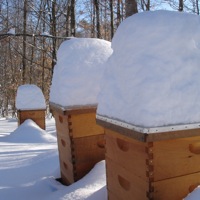But somehow it's not the end. The bee schoolers all have plans to stop by and inspect the observation hive later this summer. Rowan has received a grant to run an experiment on the Small Hive Beetle, a recent honeybee pest, and I'll be helping her with that. She's already set up six hives for the experiment at UVA's Morven Farm. And there's also talk of running another bee school in the near future, or maybe one of the new Pavilion seminars along similar lines.
Lots of excitement to come. For now, I'm going to go check the observation hive...































 Honeybees survive by acquisition, defense, and efficient
allocation of various resources, to enable successful
overwintering and reproduction. This requires
sophisticated decision making, akin to that needed by
manufacturing firms, and beyond the capability of a single bee's
brain. But when each bee follows simple
sets of rules, the aggregate effect creates an emergent
intelligence for the colony as a whole, able to react to a
dynamic environment and achieve complex optimizations.
Honeybees survive by acquisition, defense, and efficient
allocation of various resources, to enable successful
overwintering and reproduction. This requires
sophisticated decision making, akin to that needed by
manufacturing firms, and beyond the capability of a single bee's
brain. But when each bee follows simple
sets of rules, the aggregate effect creates an emergent
intelligence for the colony as a whole, able to react to a
dynamic environment and achieve complex optimizations.
 We're interested in understanding some of the
mathematical principles underlying the colony
intelligence of honeybees. We meet roughly every other
week from October through April to discuss articles
from the scientific literature on honeybees. We also
do some mathematical modeling of specific honeybee
optimization behaviors. Along the way, we learn some
aspects of honeybee biology and ecology, as well as
the history and practice of beekeeping.
We're interested in understanding some of the
mathematical principles underlying the colony
intelligence of honeybees. We meet roughly every other
week from October through April to discuss articles
from the scientific literature on honeybees. We also
do some mathematical modeling of specific honeybee
optimization behaviors. Along the way, we learn some
aspects of honeybee biology and ecology, as well as
the history and practice of beekeeping.
 We're also interested in getting to know each other,
and getting to know the bees. In the Fall and Spring, we
meet regularly at Professor Gromoll's home for
hands-on activities in the apiary. This includes an
opening breakfast in the Fall, and a dinner in the
Spring. We'll also start a new honeybee colony for the
group, and take a field trip to a larger apiary in the
area.
We're also interested in getting to know each other,
and getting to know the bees. In the Fall and Spring, we
meet regularly at Professor Gromoll's home for
hands-on activities in the apiary. This includes an
opening breakfast in the Fall, and a dinner in the
Spring. We'll also start a new honeybee colony for the
group, and take a field trip to a larger apiary in the
area.

